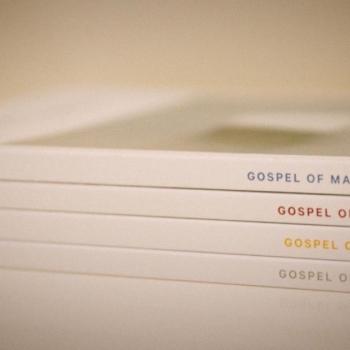As a preacher and occasional writer, I am naturally drawn to the Old Testament. I suppose one of the reasons for that is because I was raised so much on the New Testament, and when I did hear about the Old Testament, it was often just character studies that ended with encouragements to be like Joseph or don’t be like Samson. When I really started learning covenant theology and began reading the whole Bible as Jesus’ story, I was naturally drawn to the see the hidden nuggets of Christological gold in the Hebrew Bible, and to share them with people who had grown up as ‘New Testament Christians,’ encouraging them to become ‘Biblical Christians.’
The series New Studies in Biblical Theology is a fine series overseen by pastor-scholar D.A. Carson, attempting to understand individual books in the Bible on their own terms and in context with

the rest of the biblical canon. Barry Webb’s contribution, Five Festal Garments, is an excellent volume in the series. The book digs deeply into 5 somewhat unrelated books, Songs of Songs, Ruth, Lamentations, Ecclesiastes, and Esther, the only unifying threads being that the books rarely mention God, that they are all related to Jewish festivals, and that most Christians don’t really know what to do with these books, in terms of thoughtful application to their own lives, and how they fit into the bigger story of Scripture.
The title of the book is a bit odd, but intriguing. It’s a reference to the episode in Genesis 45, where Joseph gives gifts to his reconciled brothers, including clothes, and gives 5 ‘festal garments’ to the youngest, Benjamin. As Webb writes, “There could be no question of the brothers refusing these garments, but they would always wear them rather awkwardly. Much the same could be said of the five Scrolls [biblical books]. They are all problem books in one way or another.”
In the first section, on The Song of Songs, Webb deals with various attempts to interpret the book, all hinging on the person of Solomon, and ultimately sides with those who would read a single love poem approach over a love poetry collection approach. Webb sees the book as a conversation between two lovers that has both an earthy side and a wisdom application to it. “”[W]hat is being suggested is that the love depicted here… has its ultimate source in Yahweh, and indeed partakes of his very nature. In keeping with the allusive character of the Song, however, this powerful point is made with exquisite indirectness rather than being crudely forced upon us. The Song is not as secular as it at first appears.” Those interpreters who see The Song of Songs as a collection of ancient love poems may find Webb’s attempts to harmonize the story by seeing much of it as dream and fantasy a little too neat, but his explanation of Solomon as an emblem of romance that the lovers evoke is fairly convincing. Certainly his explanation of how the book fits into the story and themes of the Bible should be acceptable and encouraging to any interpreter who believes in the divine character of Scripture.
The book of Ruth is probably the easiest of the 5 books to read Christologically, with its ties to David and Jesus’ genealogy and its presentation of redemption in Bethlehem. Dr. Webb describes the book as a romantic comedy that is on the surface gentle, but on deeper layers quite controversial. The author does fine work in showing how the characters in Ruth relate to each other. I especially appreciated his discussion on how the book interacts with the law of Moses, particularly the ban on Hebrew-Moabite marriage, as well as his discussion of how the theme of kindness is picked up in Paul’s descriptions of salvation in Christ.
In the chapter on the book of Lamentations, there is a fascinating discussion of how a literary work on the radical disorientation that suffering brings us should be so well-ordered and logical. Lamentations is one of the most obscure books in the Bible, requiring background knowledge of the destruction of the temple in 587 BC and the exile of God’s people, and it has always seemed a difficult book to preach through. Webb is immensely helpful here, as he presents themes that could be preached in ways that could speak powerfully to modern people, and shows the connection of apparently meaningless suffering to Christ.
In analyzing Ecclesiastes, Webb takes the fairly standard two-voice view, and breaks the structure of the book into mostly alternating observation and instruction passages. Having read quite a few books on Ecclesiastes, the best part of the chapter for me was the author’s discussion of how Ecclesiastes is understood and echoed by the New Testament.
Esther is the only book in the Bible that never mentions God. And yet, the argument is made in Five Festal Garments that all clues in the book lead obviously to Yahweh. Mordecai is hinted at as a type of Christ, but I wish the author had gone further in looking at Mordecai’s figurative death, resurrection, exaltation, vanquishing of his enemies, and restoration of shalom to his people. There is a fascinating discussion on the morality of the exiles in Babylon and whether the narrator approves or disapproves of much of the characters’ actions in Esther, and an encouragement for us link this story with Christians who live in exile. Maybe Webb’s most inspiring prose is saved for the end of this chapter: “The book of Esther is indeed a festive garment, a garment to put on when we are astonished, once again, at some unexpected way God has rescued us, and when we are ready to celebrate. But it is also a garment to put on when the forces arrayed against us seem all-powerful, when to laugh may be the only way to stay sane. To put this garment on, however, is not to whistle in the dark, or to pretend that things are other than they are. It is to clothe ourselves with the truth that God is sovereign, and to be reminded that nothing can ultimately thwart his purposes. To put on Esther is to affirm that God is our deliverer, and to share in the laughter of heaven.”
By the end of my reading, I couldn’t believe that the book was only 136 pages. Dr. Webb shows a great gift here (that many Christian writers could learn from) of packing a lot of meat into a small container. If you want to learn more about some biblical books that are not often preached in modern churches, I would highly recommend this very readable book. I have preached series on Ruth and Esther, and am inspired in the future to preach on the other 3 books chronicled in this volume.













